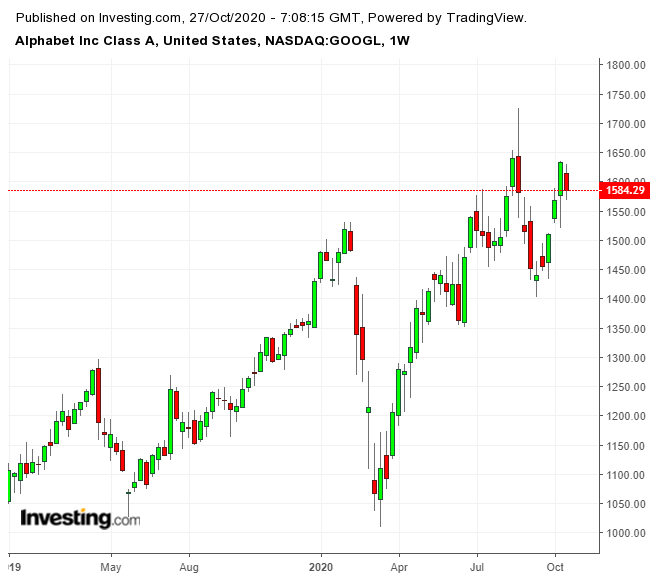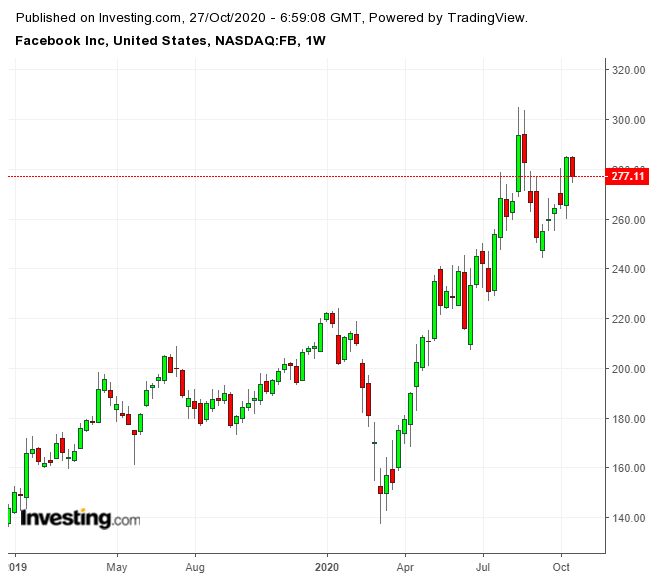The world’s two largest social media companies—Alphabet (NASDAQ:GOOGL) and Facebook (NASDAQ:FB)—are scheduled to release their Q3 2020 earnings reports Thursday, Oct. 29 after markets close. Investors await signs that for the digital ad market badly hurt by the pandemic, the worst is over.
For Alphabet, the parent company of search engine behemoth Google, the business climate is becoming quite challenging. The California-based company reported its first drop in sales in its 22-year history in its Q2 earnings report in July.
For the latest quarter, which ended on Sept. 30, analysts’ consensus is for $11.3 in earnings per share on sales of $42.76 billion.
With Alphabet's heavy reliance on advertising spending from sectors like travel and hospitality, which are under pressure for the foreseeable future, analysts seem to agree that this year will be one of Google’s toughest in terms of sales.
The company generally doesn’t provide forecasts, though Chief Executive Sundar Pichai said in July he saw early signs of potential stabilization. One bright area that could pick up some of the slack in the current weak digital ad market is the company’s cloud-computing business, which continued to grow even during the pandemic, soaring 43% in Q2.
Besides earnings, investors will also be keen to know the company’s position on the Justice Department’s anti-trust lawsuit filed this month, alleging that Google uses anti-competitive tactics to preserve a monopoly for its flagship search engine and related advertising business.
The lawsuit is the “most aggressive U.S. legal challenge” to a company’s dominance in the tech sector in more than two decades, according to the Wall Street Journal.
Despite these setbacks, Google’s massive cash pile, its pledge to continue share buybacks, and the strength of its cloud and YouTube businesses are helping its stock sustain these pressures. Shares are up more than 20% in 2020. They closed yesterday at $1,584.29, down about 3% for the day.

Small Businesses Fuel Facebook’s Sales
On average, analysts are expecting Facebook to show EPS of $1.89 on sales of $19.75 billion. The California-based social media giant is well-positioned to withstand the economic shock due to swelling user-engagement during the pandemic.
One major strength that distinguishes Facebook from other social media platforms: its powerful and highly diversified revenue stream. Though it certainly benefits from them, it's not dependent on big brands, which are cutting their ad budgets to deal with the economic downturn.
The vast majority of Facebook’s 8 million advertisers are small businesses, many of whom rely heavily on Facebook’s global reach for their sales.
To counter the sudden disappearance of foot traffic, these businesses are shifting to digital marketing, and Facebook is in a great position to take advantage of this trend through its vast ecosystem, led by its Instagram app. The evidence of this strength was on display during Q2 when profit doubled.

Facebook’s shares are up about 33% this year, even after incorporating recent weakness in markets, showing that investors expect the company to emerge unscathed after the pandemic. They closed yesterday at $277.11, down just over 2.5% on the day.
